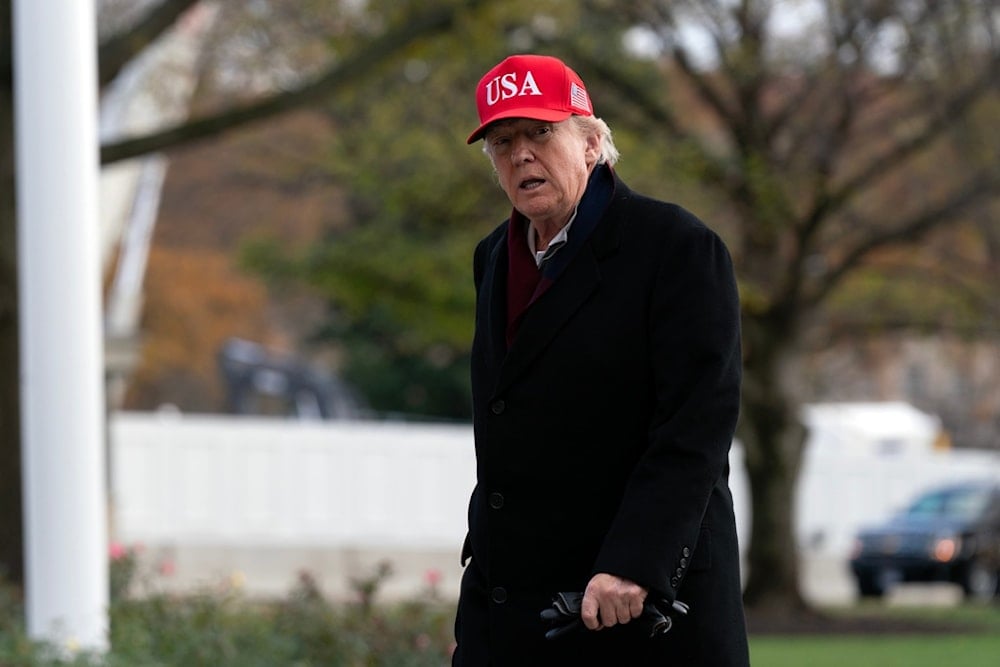'Miscommunication' halts meeting on Trump 28-point Ukraine peace plan
Axios reports a misunderstanding over Trump’s 28-point peace plan caused the cancellation of a Zelensky-Witkoff meeting on Ukraine settlement talks.
-

President Donald Trump walks on the South Lawn upon his arrival at the White House, Saturday, November 22, 2025, in Washington (AP)
A misunderstanding between Kiev and Washington over the nature of the US administration’s proposed 28-point plan for resolving the conflict in Ukraine led to the cancellation of a planned meeting between Ukrainian President Volodymyr Zelensky and US Special Envoy Steve Witkoff, Axios reported on Monday, citing officials familiar with the discussions.
According to Ukrainian officials, Kiev initially viewed the 28-point plan as an early set of ideas still open to negotiation, while the US side considered it a formal proposal ready for advancement. This discrepancy resulted in Zelensky not attending a meeting scheduled on November 19.
The plan was presented in Miami last week by Witkoff and Jared Kushner, US President Donald Trump’s son-in-law, during talks with Ukrainian National Security Council Secretary Rustem Umerov. Zelensky joined part of the meeting by phone, the report said.
US media reported on November 19 that Trump approved the 28-point framework, which includes reducing US military aid, recognizing the Ukrainian Orthodox Church aligned with the Russian Orthodox Church as canonical, granting the Russian language official status in Ukraine, downsizing the Ukrainian armed forces, and prohibiting foreign troops and long-range weapons on Ukrainian territory. The proposal additionally envisions international recognition of Crimea and Donbass as Russian territories.
Ukraine signaled breakthrough
The United States and Ukraine signaled a breakthrough on Sunday after a new round of negotiations on Washington’s proposed peace framework for ending the war with Russia, with officials from both delegations describing the talks as the most constructive to date.
US Secretary of State Marco Rubio, speaking at the US mission in Geneva, said the opening session set a new benchmark for the process. It was, he noted, "probably the most productive and meaningful meeting so far in this entire process," adding that negotiators were now working through issues "point by point" with input from all sides.
Rubio explained that the teams had temporarily separated to refine technical proposals aimed at reducing the remaining disagreements. "We're working through making some changes, some adjustments, in the hopes of further narrowing the differences and getting closer to something that both Ukraine and obviously the United States are very comfortable with," he said.
He added that any final document would require presidential approval, but stressed, "I feel very comfortable about that happening." The US, he said, now has "substantial insights" into Moscow’s priorities.
Pressure mounts
The diplomatic push comes as Trump’s 28-point proposal faces skepticism at home and abroad. The leaked outline suggests Ukraine may be asked to concede additional territory, reduce its military capacity, and formally drop its NATO ambitions. Trump has insisted the proposal is not his "final offer" and has given Zelensky until Thursday to respond.
Zelensky acknowledged that the negotiations place him in a difficult position, describing the choice as a struggle between "the loss of our dignity or the risk of losing a key partner."
Over the weekend, leaders from nine European states, as well as Japan, Canada, and senior EU officials, publicly questioned the plan’s potential restrictions on Ukraine’s armed forces. They warned the proposed limitations "would leave Ukraine vulnerable to future attack," reflecting growing concern within allied capitals as Geneva talks intensify.

 3 Min Read
3 Min Read








